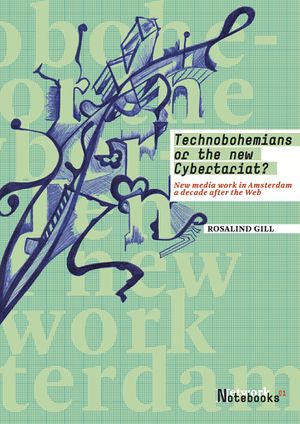Diferencia entre revisiones de «Rosalind Gill (2007) Technobohemians or the New Cybertariat. New Media Work in Amsterdam a Decade After the Web»
| (No se muestran 2 ediciones intermedias de 2 usuarios) | |||
| Línea 1: | Línea 1: | ||
| − | + | [[File: technobohemians-img.jpg | thumbnail | right]] | |
| − | + | == <small>'''Resumen'''</small> == | |
| − | + | Accounts of new media working conditions draw heavily on two polarised stereotypes, veering from techno-utopianism on the one hand, to a vision of webworkers as the new ‘precariat’, victims of neo-liberal economic policies on the other. Heralded from both perspectives as representing the brave new world of work, what is striking is the absence of research on new media workers’ own experiences, particularly in a European context. This INC commissioned research goes beyond contemporary myths to explore how people working in the field experience the pleasures, pressures and challenges of working on the web. Illustrated throughout with quotations from interviews, it examines the different career paths emerging for content-producers in web-based industries, questions the relevance of existing education and training, and highlights the different ways in which people manage and negotiate freelancing, job insecurity, and keeping up to date in a fast-moving field where both software and expectations change rapidly. | |
| + | |||
| + | == <small>'''Archivo'''</small> == | ||
| + | |||
| + | [[File: technobohemians.pdf]] | ||
| + | |||
| + | == <small>'''Fuente'''</small> == | ||
| + | |||
| + | [[Institute_of_Network_Cultures|Institute of Network Cultures]] | ||
| + | |||
| + | == <small>'''Enlaces'''</small> == | ||
| + | |||
| + | '''URL:''' http://networkcultures.org/blog/publication/no-01-technobohemians-or-the-new-cybertariat-rosalind-gill/# | ||
| + | |||
| + | '''Wayback Machine:''' https://web.archive.org/web/*/http://networkcultures.org/blog/publication/no-01-technobohemians-or-the-new-cybertariat-rosalind-gill/# | ||
[[Categoría:Biblioteca]] | [[Categoría:Biblioteca]] | ||
Revisión actual del 03:48 5 dic 2021
Resumen
Accounts of new media working conditions draw heavily on two polarised stereotypes, veering from techno-utopianism on the one hand, to a vision of webworkers as the new ‘precariat’, victims of neo-liberal economic policies on the other. Heralded from both perspectives as representing the brave new world of work, what is striking is the absence of research on new media workers’ own experiences, particularly in a European context. This INC commissioned research goes beyond contemporary myths to explore how people working in the field experience the pleasures, pressures and challenges of working on the web. Illustrated throughout with quotations from interviews, it examines the different career paths emerging for content-producers in web-based industries, questions the relevance of existing education and training, and highlights the different ways in which people manage and negotiate freelancing, job insecurity, and keeping up to date in a fast-moving field where both software and expectations change rapidly.
Archivo
Fuente
Enlaces
Wayback Machine: https://web.archive.org/web/*/http://networkcultures.org/blog/publication/no-01-technobohemians-or-the-new-cybertariat-rosalind-gill/#
